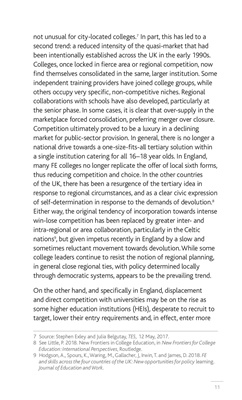
11
not unusual for city-located colleges.7 In part, this has led to a
second trend: a reduced intensity of the quasi-market that had
been intentionally established across the UK in the early 1990s.
Colleges, once locked in fierce area or regional competition, now
find themselves consolidated in the same, larger institution. Some
independent training providers have joined college groups, while
others occupy very specific, non-competitive niches. Regional
collaborations with schools have also developed, particularly at
the senior phase. In some cases, it is clear that over-supply in the
marketplace forced consolidation, preferring merger over closure.
Competition ultimately proved to be a luxury in a declining
market for public-sector provision. In general, there is no longer a
national drive towards a one-size-fits-all tertiary solution within
a single institution catering for all 16-18 year olds. In England,
many FE colleges no longer replicate the offer of local sixth forms,
thus reducing competition and choice. In the other countries
of the UK, there has been a resurgence of the tertiary idea in
response to regional circumstances, and as a clear civic expression
of self-determination in response to the demands of devolution.8
Either way, the original tendency of incorporation towards intense
win-lose competition has been replaced by greater inter- and
intra-regional or area collaboration, particularly in the Celtic
nations9, but given impetus recently in England by a slow and
sometimes reluctant movement towards devolution. While some
college leaders continue to resist the notion of regional planning,
in general close regional ties, with policy determined locally
through democratic systems, appears to be the prevailing trend.
On the other hand, and specifically in England, displacement
and direct competition with universities may be on the rise as
some higher education institutions (HEIs), desperate to recruit to
target, lower their entry requirements and, in effect, enter more
7 Source: Stephen Exley and Julia Belgutay, TES, 12 May, 2017.
8 See Little, P. 2018. New Frontiers in College Education, in New Frontiers for College
Education: International Perspectives, Routledge.
9 Hodgson, A., Spours, K., Waring, M., Gallacher, J, Irwin, T. and James, D. 2018. FE
and skills across the four countries of the UK: New opportunities for policy learning.
Journal of Education and Work.